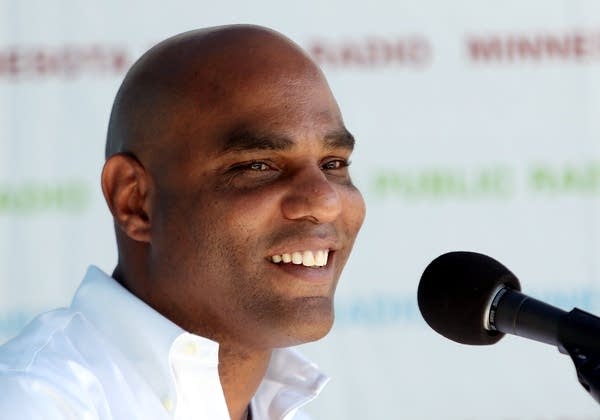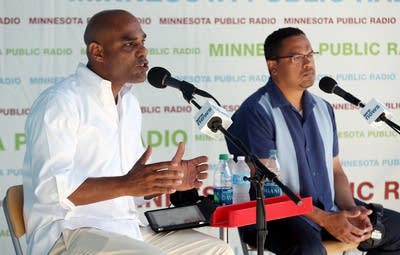Tax, budget issues divide Ellison and challenger Fields
Go Deeper.
Create an account or log in to save stories.
Like this?
Thanks for liking this story! We have added it to a list of your favorite stories.

When it comes to policy issues facing Minneapolis residents and the nation, Minnesota's 5th Congressional District Rep. Keith Ellison and his Republican opponent Chris Fields couldn't be further apart.
Take an upcoming January deadline when the Bush-era tax cuts expire and massive government spending cuts kick-in. At a Minnesota State Fair debate hosted by Minnesota Public Radio Wednesday, both candidates said the impending "fiscal cliff" is a major problem, but they disagree on what to do about it.
For his part, Fields said that most Americans simply can't afford a tax increase right now, which would be the near-term effect of letting the Bush tax cuts expire.
"I don't believe that taxes need to go up, but I do believe we need tax reform," Fields said. "My opponent wants to raise taxes. Those taxes right now will filter their way back down to the people who can't afford it right now. This is not a time to monkey around with the economy. This is a time to support hard-working families and the middle class."
Turn Up Your Support
MPR News helps you turn down the noise and build shared understanding. Turn up your support for this public resource and keep trusted journalism accessible to all.
Ellison, who is the co-chair of the U.S. House Progressive Caucus, said that's no way to tackle the deficit. He supports extending the tax cuts for lower earners.
"If we just extend all tax cuts, we will increase the deficit and the debt," Ellison said. "You cannot simply say we're going to give taxes away and not even ask the most fortunate among us to pay taxes, and say we want to cut the debt. Those two things cannot square."

Ellison said that the government could save money by eliminating oil and gas subsidies, by negotiating drug prices under Medicare, and trimming military spending.
Both candidates connected the nation's overall prosperity to the success of people living in the 5th District, especially minorities.
Ellison rattled off some of the things he's done to ensure city residents have greater opportunity, including federal funding for small business lending, workforce training, public safety efforts, and supporting transportation improvements to get people to and from their jobs.
But Fields said those policies haven't done much to address unemployment among African Americans in Minneapolis or the achievement gap between white and black students there. He said that regions with minority communities that constantly struggle financially and academically are going to end up being a bigger and bigger burden on society as a whole.
"If I'm elected, I will focus on ensuring that we close that achievement gap permanently," Fields said. "That is the key to prosperity. That is the key to minorities having access to the American dream."
Ellison defended his efforts to help minorities, and said addressing those gaps is one area where the two candidates agree.

"We do agree that these gaps are serious and need our full attention," Ellison said. "But you cannot walk very late to the game and say, 'there's a disparity, so it must be this person's fault.' Those of us who live and work on the North Side have been fighting to solve these gaps for years and we're making progress."
Fields also brought up one of the more obscure aspects of politics during the debate: campaign contributions. He said that Ellison is doing the bidding of various interest groups in Congress because they have donated to his campaign, and argued that it's part of a larger problem of entrenchment in Washington.
"We have Congress' approval ratings at 12 percent, and now they want to come home to the districts and convince us that all the money they have taken from all these special interest groups has had no effect on them," Fields said.
As examples, Fields said Ellison took $40,000 from the medical industry during this election cycle, and "thousands more" from American Crystal Sugar.
According to OpenSecrets.org, a website that tracks campaign donations, Ellison has taken $10,000 from American Crystal Sugar's political action committee and about $183,500 from the health care-related industries this election cycle.
But on both accounts, Ellison's donations are less than the donations Republican and Democratic leaders have received from the industries. For instance, House Speaker John Boehner and Texas Rep. Ron Paul have received over $1 million from the health care industry this election cycle.
Ellison defended the contributions, saying that he supports Minnesota businesses and that he's been a vocal proponent of efforts to overturn Citizens United, a 2010 Supreme Court ruling that has effectively opened the door to massive campaign donations and spending.
Dear reader,
Your voice matters. And we want to hear it.
Will you help shape the future of Minnesota Public Radio by taking our short Listener Survey?
It only takes a few minutes, and your input helps us serve you better—whether it’s news, culture, or the conversations that matter most to Minnesotans.




